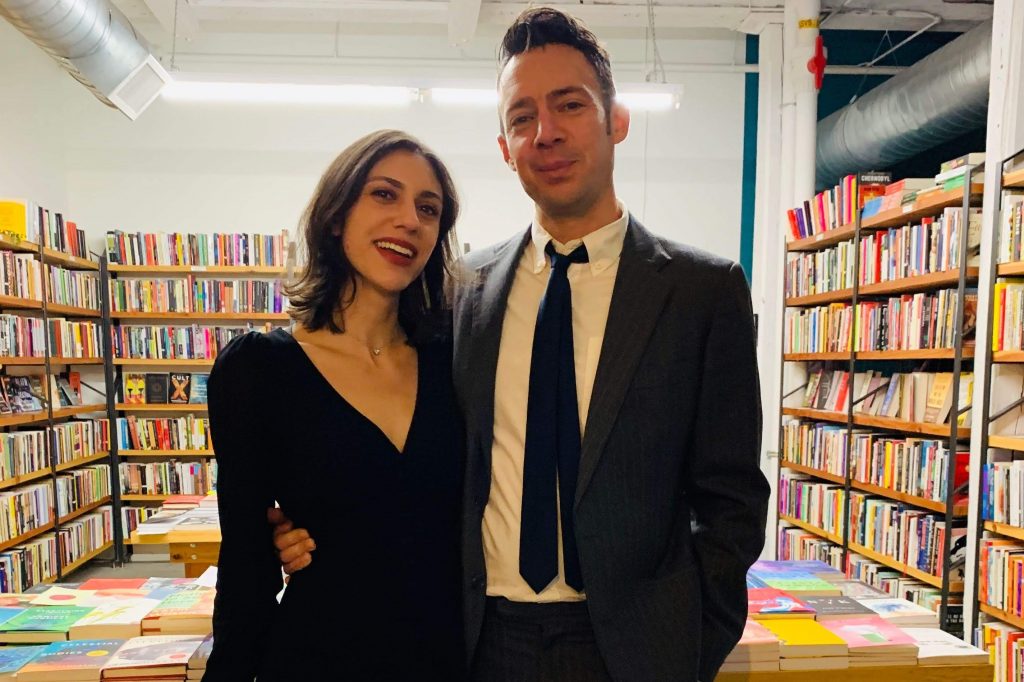On December 7, Riffraff bookstore and bar (60 Valley St. #107A, PVD) celebrated its second anniversary (see story motifri.com/riffraffturns2. Sean Carlson interviewed cofounders Emma Ramadan and Tom Roberge for Motif.

Sean Carlson (Motif): What duos or tag-teams have you admired? Any parallels you see in yourselves?
Emma Ramadan: I greatly admire husband-wife translator teams, such as the Russian translators Richard Pevear and Larissa Volokhonsky, who’re well known for their English translations of Dostoevsky and other classic Russian literature. To translate a book or to take on any creative endeavor with your spouse is very sensitive, and takes a great deal of trust and compromise. As well as running Riffraff, Tom and I have translated two books together now and it’s a lot trickier and less romantic than I expected.
Tom Roberge: I recently watched The African Queen for the first time in many years. About halfway through, I thought this is a lot like us. Humphrey Bogart’s Charlie is a bit rough around the edges, but he gets his work done, and deep down he really cares about people. And Katharine Hepburn’s Rose has this tough, no-nonsense, get-things-done attitude, but she too is romantic underneath it all and devoted to her sense of right and wrong. Of course, they fall in love and fight their way out of their predicament. One thing Emma and I always say is that despite little disagreements about which books to let go of, or how to arrange displays, we absolutely agree on what kind of books we want and how to treat everyone who works for us or comes through the door as a customer. It’s great knowing we can trust each other on so many aspects of how we do things here.
SC: Beyond your literary experiences, what other experiences have informed who you are and how you run Riffraff as a day-to-day operation?
TR: Before owning my own business, it never would have occurred to me that my time working for my father, a boilermaker, over the summers during college would have informed my own ways of managing a staff, but I’ve begun to realize that I learned a lot about how to treat employees from the way he managed his. There’s a certain generosity that’s necessary to get everyone on the same page, to identify their strengths, to understand how they learn, to appreciate what they personally find rewarding about the work, and what they want out of their job and this business. It’s a constant work in progress, of course, but I bear his example in mind as much as I can.
ER: What felt most important to me going into this that I took away from my past jobs was that I wanted Riffraff to be a place people liked to work. When our bartenders or booksellers come in on their off-hours for our events or parties because they like being in the space and like what we’re doing, nothing makes me happier than that.
SC: During these past two years, what changes have you witnessed in Providence and in the city’s arts and literary scene?
ER: I’d say the literary scene has exploded, and Providence really feels like a vibrant community for readers and writers now in a way that it didn’t even just a few years ago. In downtown Providence, the writers’ co-working space What Cheer Writers Club has helped to centralize news about literary resources and events, and that has helped a great deal. The bar scene has also exploded, which keeps us upping our game.
TR: The biggest change I’ve seen over the last couple of years is the growing sense that Providence is a fantastic place to settle down, to buy a home and to open a business. In terms of the arts and literary scene, I feel like there’s been a slight shift in where and how the events are happening, by which I mean the venues, many of which are now more widely known and accessible to more people. The scene here has always been great, it’s just that a lot of what went on had been in non-traditional venues. For example, in people’s homes, random bars on off-nights, loft spaces, et cetera. In the past couple years spaces have been offering these writers and artists more public-facing space, which is definitely a good thing.
SC: What don’t enough people realize about starting and running an independent business and their role in communities/cities?
TR: Okay, here’s the thing: it really is true that money spent in the community stays in the community, and that is in every way possible a very good thing. We hire locally, pay taxes locally, buy from local vendors, all of that. Which helps contribute to a sustainable local economy and better overall quality of life, even for people who don’t shop here.
ER: The bottom line is that if you care about living in a community where there are local businesses, you need to shop in them. If you can buy something from a local store rather than on the internet, do it. Otherwise, these stores that make a community vibrant and sustainable will all disappear. It’s a very real possibility.
SC: As a bar as well as a bookstore, is your approach to sourcing drinks comparable to how you select your books?
TR: Our drink selections — everything from the beer and wine to the spirits — are curated by necessity, much like in the bookstore. We have limited space, and we want everything to meet a certain standard. We want our drinks to likewise feel different and diverse, so we try to stock interesting tastes and we regularly rotate what we carry.
SC: And did a beer rep once ask if you were okay because Elliott Smith was playing on Riffraff’s stereo?
TR: You know what, sometimes you just need to listen to Elliott Smith.
ER: No you don’t!


